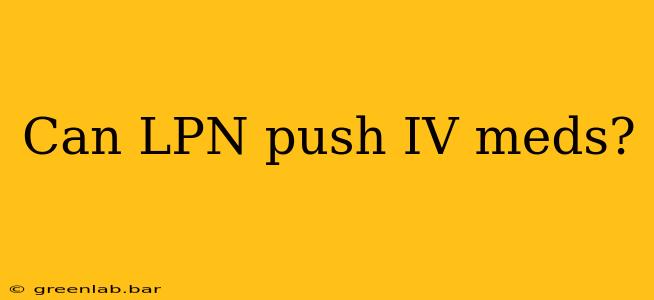Can LPNs Push IV Meds? A Comprehensive Guide for Nurses and Patients
The question of whether Licensed Practical Nurses (LPNs) can administer IV medications is a complex one, varying significantly depending on state regulations, the specific healthcare setting, and the LPN's individual training and certification. There's no single, universally applicable answer. This guide will delve into the nuances of this issue, providing clarity for both LPNs and those seeking to understand their scope of practice.
The Short Answer: Sometimes, but not always.
The Longer, More Accurate Answer: The legality and appropriateness of LPNs administering IV medications hinge on several crucial factors:
State Laws and Regulations: The Primary Determinant
State boards of nursing hold the ultimate authority in defining the scope of practice for LPNs within their respective jurisdictions. Each state's Nurse Practice Act is the governing document. These acts outline the specific tasks and procedures LPNs are legally permitted to perform. Some states explicitly allow LPNs to administer IV medications under certain conditions, while others strictly prohibit it. Therefore, it's crucial for LPNs to thoroughly familiarize themselves with their state's Nurse Practice Act.
Healthcare Setting and Institutional Policies
Even in states where IV medication administration is permitted for LPNs, the specific healthcare setting plays a critical role. Hospitals, clinics, and other facilities may have their own internal policies regarding medication administration, which might further restrict or expand an LPN's responsibilities. These policies often consider factors such as:
- Patient acuity: LPNs might be allowed to administer IV medications to stable patients but not to those in critical condition.
- Type of medication: The administration of certain IV medications may be reserved for Registered Nurses (RNs) due to their complexity or potential for adverse effects.
- Level of supervision: LPNs may be permitted to administer IV medications only under the direct or indirect supervision of an RN or physician.
Individual LPN Training and Competency
To legally and safely administer IV medications, an LPN must receive appropriate training and demonstrate competency in this specific skill. This training typically involves:
- Formal education: Many LPN programs offer training in IV medication administration, but this isn't universally true.
- On-the-job training: Hospitals or clinics may provide further training and competency assessments before allowing LPNs to independently administer IV medications.
- Continuing education: Maintaining competence requires ongoing professional development and adherence to best practices.
Types of IV Medication Administration
The term "pushing IV meds" typically refers to bolus injections, where medication is administered directly into the vein. The complexity of this procedure varies widely depending on the medication. LPNs might be permitted to administer some IV medications via infusion (continuous drip) while being restricted from bolus injections. This distinction is often outlined in facility policies and state regulations.
Patient Safety: The Paramount Concern
Regardless of state laws or institutional policies, the ultimate priority is always patient safety. LPNs must adhere to strict protocols, meticulously follow physician orders, and carefully monitor patients for any adverse reactions. Any deviation from established procedures or concerns about patient safety should be immediately reported to a supervising nurse or physician.
In conclusion: Whether an LPN can push IV meds depends on a multifaceted interplay of state regulations, facility policies, individual training, and the specific medication and patient situation. It's imperative for LPNs to stay informed about the legal and ethical parameters of their practice, and for patients to verify their healthcare providers' credentials and qualifications. When in doubt, always consult the appropriate governing body or healthcare professional.

